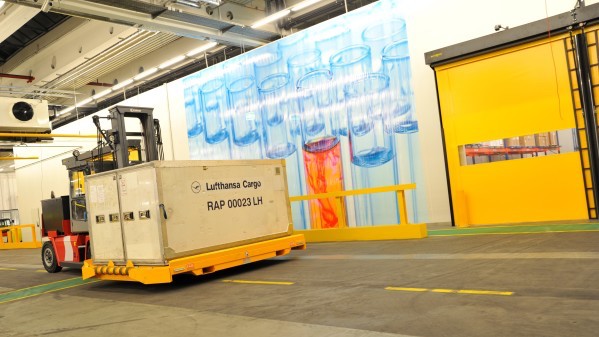Pharma-Hub Frankfurt Airport is the leading European hub for the handling of temperature-sensitive goods
Aug 26, 2020At Frankfurt Airport (FRA), approximately 120,000 tons of vaccines, medications and other pharmaceutical products were handled in 2019. This makes FRA the European leader. In this position, airport operator Fraport and Lufthansa Cargo, together with other partners of the air cargo community[1] at the site, see themselves well prepared for handling a possible corona vaccine.

Currently, around 12,000 square meters of temperature-controlled handling capacity with direct apron access are available at Frankfurt Airport. A good two thirds of this is located in the highly modern Lufthansa Cargo Pharma Hub. An additional 2,000 square meters of space on the further airport grounds are about to be taken into operation. These areas meet international and European standards. For example, Fraport has been meeting the requirements of the CEIV Pharma certificate[2] of the airline association IATA since 2018, as have eleven other service companies operating in Frankfurt. In addition, there are freight forwarders and airlines that meet the EU GDP standard[3]. This means that more than 75 percent of the transport routes at the airport are certified. In addition, Fraport currently uses 20 ultra-modern thermal transporters to ensure the necessary temperature of the goods on their way across the apron as well.
"Frankfurt Airport offers the ideal infrastructural conditions for the handling of pharmaceutical goods. We are closely monitoring the current research for a corona vaccine. When the time comes, we will provide the best possible support together with our partners in the distribution of vaccines and medicines," says Max Philipp Conrady, Head of Central Cargo Infrastructure at Fraport. "Already during the handling of urgently needed protective equipment and partly vital pharmaceutical goods at the beginning of the year, we showed that we, as a cargo community, make an essential contribution to supplying the population".
Lufthansa Cargo is also well prepared to fly a possible corona vaccine around the world. With far reaching destinations and 31 pharmaceutical stations worldwide, all of which are to be CEIV Pharma-certified by the end of 2021, the cargo airline has an excellent network. This means that temperature-sensitive goods, such as vaccines or medicines, can be brought to their destination as quickly as possible. "The last few months have clearly shown us how important well-functioning supply chains are, especially in times of crisis. When it comes to transporting a vaccine against the corona virus, Lufthansa Cargo will also do everything it can to enable fast distribution by air," said Jörg Bodenröder, Director of Handling Specials at Lufthansa Cargo. As one of the first airfreight carriers to focus, among other things, on the transport of temperature-sensitive goods, Lufthansa Cargo can draw on many years of experience in the transport of pharmaceuticals. With almost all the transport options available on the market, customers also have access to a broad product portfolio in which nearly all requirements can be met.
Similar Stories

American Airlines becomes only carrier to fly nonstop between Washington, D.C., and San Antonio
View ArticleOpen Skies agreement with the Dominican Republic enters into force
The U.S.-Dominican Republic Air Transport Agreement entered into force on December 19. This bilateral agreement establishes a modern civil aviation relationship with the Dominican Republic consistent with U.S. Open Skies…
View Article
WorldACD Weekly Air Cargo Trends (week 50) - 2024
View Article
Aeromexico now connects Miami with Cancun
View Article
EUROCONTROL Aviation long term outlook expects aviation to reach 15.4 million flights in 2050
View Article
Etihad Cargo adds Paris to freighter network with new weekly service
View ArticleGet the most up-to-date trending news!
SubscribeIndustry updates and weekly newsletter direct to your inbox!





